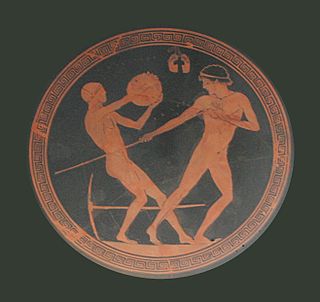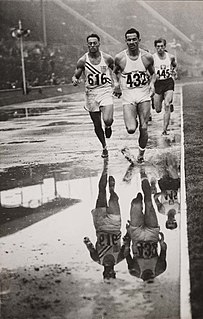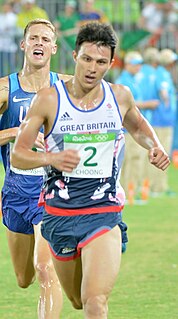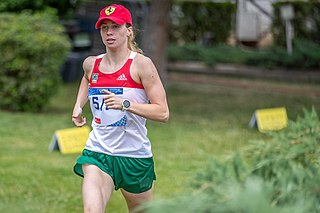
A pentathlon is a contest featuring five events. The name is derived from Greek: combining the words pente (five) and -athlon (competition). The first pentathlon was documented in Ancient Greece and was part of the Ancient Olympic Games. Five events were contested over one day for the Ancient Olympic pentathlon, starting with the long jump, javelin throwing, and discus throwing, followed by the stadion and wrestling. Pentathletes were considered to be among the most skilled athletes, and their training was often part of military service—each of the five events in the pentathlon was thought to be useful in war or battle.
The modern pentathlon at the 2000 Summer Olympics in Sydney was held from 30 September to 1 October 2000. The men's and women's events each involved 24 athletes. The venues for the events were The Dome and Exhibition Complex, the Sydney International Aquatic Centre (swimming), and Sydney Baseball Stadium. For the first time in Olympic history, modern pentathlon at these Olympic games had the highest ratio of NOC representation with respect to its quota out of all the sports, and also, the women's event was officially included in the program.

The modern pentathlon at the 2004 Summer Olympics was held from 26 to 27 August 2004, at the Olympic Modern Pentathlon Centre at the Goudi Olympic Complex. The men's and women's events each involved 32 athletes, an increase of eight from the previous games.
The World Athletics Indoor Championships are a biennial indoor track and field competition served as the global championship for that version of the sport. Organised by the World Athletics, the competition was inaugurated as the World Indoor Games in 1985 in Paris, France and were subsequently renamed to IAAF World Indoor Championships in 1987. The current name was adapted with the name change of the sports governing body in 2019.

The pentathlon or women's pentathlon is a combined track and field event in which each woman competes in five separate events over one day. The distance or time for each event is converted to points via scoring tables, with the overall ranking determined by total points. Since 1949 the events have been sprint hurdling, high jump, shot put, long jump, and a flat race. The sprint hurdles distance was 80 m outdoors until 1969 and thereafter 100 m; in indoor pentathlon the distance is 60 m. The flat race was 200 m until 1976 and thereafter 800 m. In elite-level outdoor competition, the pentathlon was superseded in 1981 by the heptathlon, which has seven events, with both 200 m and 800 m, as well as the javelin throw. Pentathlon is still contested at school and masters level and indoors.

The European Athletics Indoor Championships is a biennial indoor track and field competition for European athletes that is organised by the European Athletic Association. It was held for the first time in 1970, replacing the European Indoor Games, its predecessor event first held in 1966.

Tia Hellebaut is a retired Belgian track and field athlete, as well as a chemist, who started out in her sports career in the heptathlon, and afterwards specialized in the high jump event. She has cleared 2.05 metres both indoors and outdoors.

William Oscar Guernsey Grut was a Swedish modern pentathlete. He competed at the 1948 Summer Olympics in London, where he won the gold medal in modern pentathlon. Grut was a multiple Swedish swimming champion and received the Svenska Dagbladet Gold Medal in 1948.
Victoria Anatoliïvna Tereshchuk is a female former modern pentathlete from Ukraine. A competitor since 1999 she was awarded a bronze medal in the women's modern pentathlon event at the 2008 Summer Olympics in Beijing but was subsequently stripped of the medal after a doping re-test. She was World Champion in the individual and mixed relay events in 2011. For her World Championship victories, she was named Ukrainian Sportswoman of the Year and received the Order of Princess Olga in the Second Class. She is also the 2008 European Champion and competed at the 2004 and 2012 Olympic modern pentathlon tournaments, where she finished seventh and twenty-third respectively.

The Union Internationale de Pentathlon Moderne, commonly known by the acronym UIPM, has been the international governing body of modern pentathlon since its foundation in London in 1948. Its headquarters are in Monte-Carlo, Monaco, and it has 115 national federation members. Modern pentathlon was introduced at the fifth Olympiad in Stockholm, Sweden, in 1912, comprising the contemporary sports of pistol shooting, fencing, swimming, horse riding and running, which embraced the spirit of its ancient counterpart.

Ceglédi Vasutas Sportegyesület, commonly referred to as Ceglédi VSE is a Hungarian sports club based in Cegléd, Pest County. It consists of multiple departments, namely football, athletics and wrestling. The team's colours are yellow and blue.
The Modern Pentathlon Association Great Britain is the national governing body for the sport of modern pentathlon in Great Britain, recognised by the Union Internationale de Pentathlon Moderne. Modern Pentathlon, the sport Baron Pierre de Coubertin called ‘the veritable consecration of the complete athlete’ comprises five events: fencing, swimming, riding, shooting and running. Today's competition involves fencing épée for a single hit against each of the other competitors; swimming 200 metres freestyle; riding an unknown horse round a show-jumping course, and then running four 800 metre laps each preceded by shooting at five targets with a laser pistol. First appearing in the Olympic Games of 1912 at the specific request of de Coubertin, founder of the Modern Olympic Games, the same five sports have comprised this greatest of all Olympic challenges and the sport completed one hundred years of unbroken Olympic participation in 2012. Despite technological changes the five events have remained essentially the same. In Stockholm in 1912, competitors brought their own horses, fenced outdoors without electric equipment, used military pistols and swam and ran outdoors. The Stockholm event took six days to complete while the super-athletes of today finish in a single day; in 1912 only men competed while today women share equal billing; the 1912 competitors were nearly all military men while today civilians generally dominate the sport. The recent changes in the sport which combine shooting and running in a single event and make use of laser pistols are some of the exciting new developments that put Modern Pentathlon at the forefront of 21st century sporting advances. Even after one hundred years of Olympic competition, Modern Pentathlon's ability to move with the times has made it the true test of the all-round Olympic super athlete.
Mhairi Spence is a British modern pentathlete. She has won a series of medals at European and World Championships, but was not selected for the 2008 Summer Olympics by the British team due to the limited number of places available. After considering retiring in 2009, she returned to the sport and in 2012 she won gold medals in both the individual and the team events at the 2012 World Championships, and qualified to be chosen for the 2012 Summer Olympics.

Combined events at the Summer Olympics have been contested in several formats at the multi-sport event. There are two combined track and field events in the current Olympic athletics programme: a men's decathlon and a women's heptathlon.
The 2015 World Modern Pentathlon Championships was held in Berlin, Germany from 28 June to 6 July 2015. The event included pistol shooting, fencing, 200m swimming, show jumping and a 3 km run.

Joseph Choong is a British modern pentathlete. He won the gold medal in the event at the 2020 Summer Olympics and the World title in 2022.
Katherine Elizabeth French is a British modern pentathlete who won the gold medal at the 2020 Summer Olympics in Tokyo, Japan.
The 2016 UIPM Senior World Championships were held in Moscow, Russia from 23 to 29 May 2016. The event includes pistol shooting, fencing, 200m swimming, show jumping and a 3km run.

Charles Fernandez is a Guatemalan modern pentathlete. He competed at the 2016 Summer Olympics in the men's event and finished fifteenth. Fernandez won the men's modern pentathlon at the 2015 Pan American Games. He also won a gold medal at the World Junior Championships. Fernandez has competed in three World Modern Pentathlon Championships as well as multiple youth and junior world championships and a Central American and Caribbean Games.

Michelle Gulyás is a Hungarian modern pentathlete. She won the silver medal in the women's individual event at the 2022 World Modern Pentathlon Championships held in Alexandria, Egypt.











